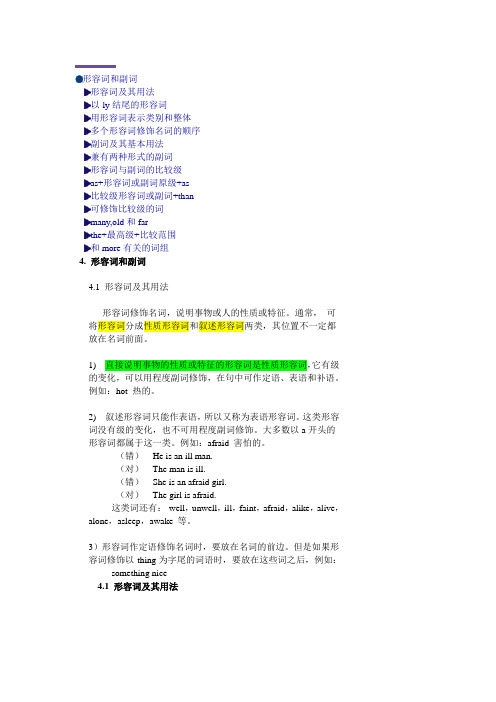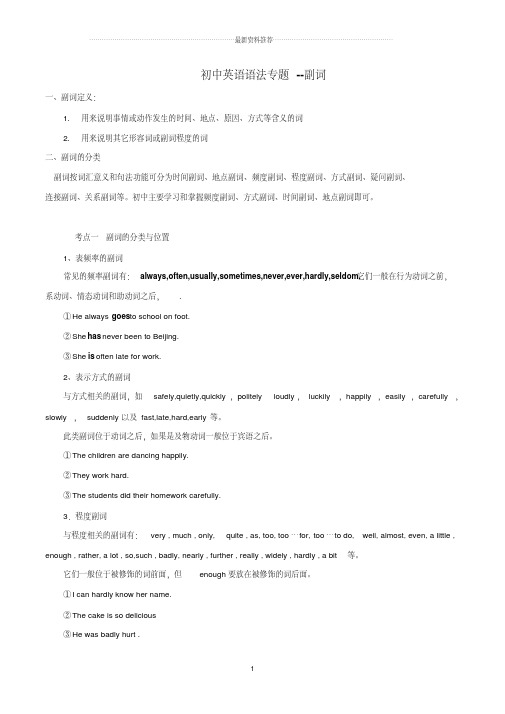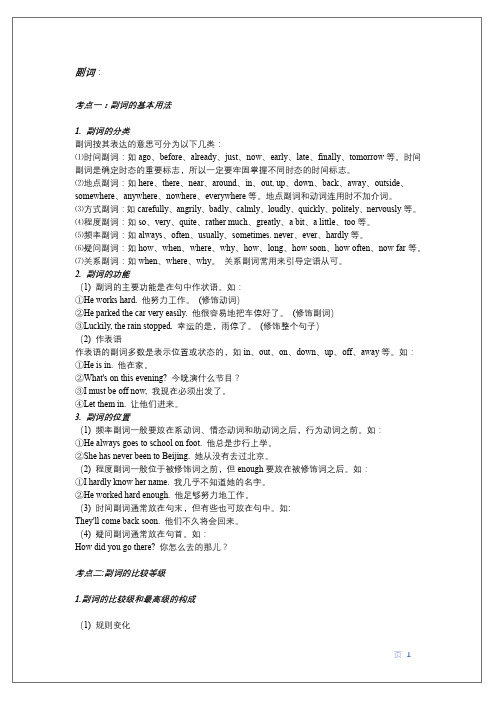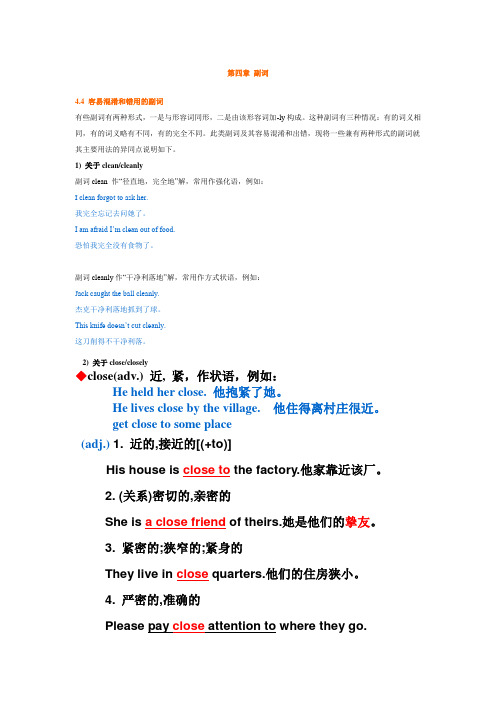兼有两种形式的副词
05 - 副词和副词词组

副词的用法—修饰词组
5.某些程度副词可以修饰限定词 We walked about 5 miles. There were quite a lot of people at Louis’s party. Virtually(差不多) all the students participated in the discussion. They recovered roughly (大约)half their equipment. I didn’t have more than a dollar on me. 6.修饰名词和整个名词词组 在非正式语体中,少数几个(如quite, rather等)程度副词能作前置修饰 语,置于限定词之前修饰整个名词词组。 It takes quite some time. That’s quite a story. She’s rather a fool.
英语语法:兼有两种词形的副词及其用法的区别

【导语】整理了英语语法:兼有两种词形的副词及其⽤法的区别,快来看看吧!希望能帮助到你~更多相关讯息请关注! 兼有两种词形的副词及其⽤法区别 有些形容词变为副词时,可在词尾加-ly,也可以不加,两者在含义和⽤法上有相同之处,也有不同之处: 1. bright 与brightly的⽤法区别 两者都可表⽰“明亮地”,但bright通常只与shine连⽤,且应置于其后,⽽brightly则可与其他动词(或分词等)连⽤,且可置于动词之前或之后: The stars were shining bright [brightly]. 星光灿烂。
The temple is brightly painted. 这座庙被漆得亮堂堂的。
2. cheap 与cheaply的⽤法区别 两者均可表⽰“便宜地”、“廉价地”,但前者主要与表⽰“买”(如buy, get, pick up等)或“卖”(如sell)之类的动词连⽤,且置于其后;后者⽤法较⼴,可置于动词之前或之后: The radio was cheaply bought [was bought cheap]. 这收⾳机买得很便宜。
The room was cheaply furnished. 屋⾥配置了便宜的家具。
3. clear与clearly的⽤法区别 两者均可表⽰“清晰地”、“不模糊地”,有时可换⽤,但是若其前有修饰语,则只能⽤clearly: He spoke loud(ly) and clear(ly). 他说得既宏亮⼜清楚。
He spoke quite [very] clearly. 他说得很清楚。
4. deep与deeply的⽤法区别 两者均可表⽰“深”、“深深地”,修饰具体的动作, 有时可互换: The doctor asked me to breathe deep [deeply]. 医⽣叫我做深呼吸。
修饰静⽌状态、介词短语或表⽰深夜等,通常⽤deep(偶尔也⽤deeply): He sat there deep in thought. 他坐在那⼉深思。
副词中考讲义(针对浙江省)

中考专题复习之副词(学生版)副词一、定义副词主要用来修饰动词,形容词,副词或其他结构。
二、副词的位置1)在之前。
2)在动词和动词之后。
注意:a. 大多数方式副词位于句尾,但宾语过长,副词可以提前,以使句子平衡。
We could see very clearly a strange light ahead of us.我们清楚地看到前面有奇怪的光。
b. 方式副词well,hard等只放在。
例如:他英语说得好。
注意1:副词very 可以修饰形容词,但不能修饰。
I very like English.注意2:副词enough要放在形容词的,形容词enough放在名词。
I don't know him . 他我不熟悉。
There is for everyone to eat.有足够的食物供每个人吃。
三、兼有两种形式的副词1)close与closelyclose意思是;closely 意思是。
Watch him .He is sitting to me.2)late 与latelylate意思是;lately 意思是。
You have come too .What have you been doing ?3)deep与deeplydeep意思是,表示;deeply意思是,表示。
Even father was moved by the film.He pushed the stick into the mud.4)high与highlyhigh表示;highly 。
The plane was flying .I think of your opinion.5)wide与widelywide表示;widely表示。
He opened the door .English is used in the world.6)free与freelyfree的意思是;freely 的意思是。
You can eat free in my restaurant whenever you like.无论什么时候,我这饭铺免费对你开放。
英语中形容词和副词的用法详解

形容词和副词形容词及其用法以-ly结尾的形容词用形容词表示类别和整体多个形容词修饰名词的顺序副词及其基本用法兼有两种形式的副词形容词与副词的比较级as+形容词或副词原级+as比较级形容词或副词+than可修饰比较级的词many,old和farthe+最高级+比较范围和more有关的词组4. 形容词和副词4.1 形容词及其用法形容词修饰名词,说明事物或人的性质或特征。
通常,可将形容词分成性质形容词和叙述形容词两类,其位置不一定都放在名词前面。
1)直接说明事物的性质或特征的形容词是性质形容词,它有级的变化,可以用程度副词修饰,在句中可作定语、表语和补语。
例如:hot 热的。
2)叙述形容词只能作表语,所以又称为表语形容词。
这类形容词没有级的变化,也不可用程度副词修饰。
大多数以a开头的形容词都属于这一类。
例如:afraid 害怕的。
(错)He is an ill man.(对)The man is ill.(错)She is an afraid girl.(对)The girl is afraid.这类词还有:well,unwell,ill,faint,afraid,alike,alive,alone,asleep,awake 等。
3)形容词作定语修饰名词时,要放在名词的前边。
但是如果形容词修饰以-thing为字尾的词语时,要放在这些词之后,例如:something nice4.1 形容词及其用法形容词修饰名词,说明事物或人的性质或特征。
通常,可将形容词分成性质形容词和叙述形容词两类,其位置不一定都放在名词前面。
1)直接说明事物的性质或特征的形容词是性质形容词,它有级的变化,可以用程度副词修饰,在句中可作定语、表语和补语。
例如:hot 热的。
2)叙述形容词只能作表语,所以又称为表语形容词。
这类形容词没有级的变化,也不可用程度副词修饰。
大多数以a 开头的形容词都属于这一类。
例如:afraid 害怕的。
(错)He is an ill man.(对)The man is ill.(错)She is an afraid girl.(对)The girl is afraid.这类词还有:well,unwell,ill,faint,afraid,alike,alive,alone,asleep,awake 等。
英语中副词的用法

精选课件
4
3) 方式副词:
carefully, properly(适当地), anxiously(焦虑地), suddenly, normally(正常地), fast, well, calmly(冷静 地), politely(有礼貌地), proudly(自豪地), softly, warmly ,slowly
精选课件
12
6)否定副词在句首,句子要部分倒装,如: Never have I felt so excited! 我从来没有觉得这么激动!
精选课件
13
比较等级
副词和形容词一样,也有它的比较级和最高 级形式. 可以参考形容词的变换形式。但以 词尾 -ly 结尾的副词(除 early 本来就原 形)须用 more 和 most 。
于much The plane was flying high. I think highly of your opinion.
精选课件
23
5) wide与widely
wide表示空间宽度;widely意思是"广泛 地","在许多地方"
He opened the door wide.
English is widely used in the world.
〔C〕 you run for fifteen minutes
〔D〕 fifteen?minute walking
2) The gorilla(大猩猩), while 〔A〕 not quite as curious than 〔B〕 the chimpanzee(黑 猩猩), shows more persistence 〔C〕 and memory retention(记忆力) in solving 〔D〕 a problem.
【直击中考】甘肃省2014中考英语总复习 第二部分 语法专题突破 专题七 形容词和副词(含历年中考真题)

专题七形容词和副词考点分析解读甘肃中考对形容词、副词词义的考查设题以对话形式为主,语境丰富,对形容词的考查涉及形容词词义辨析、形容词的比较级和最高级、与形容词比较级和最高级相关的固定句型、形容词作定语的位置以及易混形容词的用法辨析等;对副词的考查主要包括常见副词的用法、副词等级的各种句型、易混副词的辨析等;形容词和副词混合考查也是近三年涉及到的重要考点。
近几年涉及到的辨析包括(alone与lonely,terribly与terrible等)。
重难点精讲(懒人听讲解)考点精讲形容词和副词用法及辨析考点一形容词和副词的用法(每年重点考查)1.形容词作定语。
形容词修饰名词一般放在名词之前,如:an interesting book; 但修饰不定代词作定语时,经常放在其后,如:somebody strange, anywhere relaxing。
2.形容词作表语形容词作表语放在be动词或系动词后。
如:The room is very clean.这个房间非常干净。
The trees turn green in spring.春天树变绿了。
3. 形容词作宾语补足语形容词放在宾语后,进一步补充说明宾语,作宾语补足语。
如:I find it easy to learn English well.我发现英语是很容易学好的。
4. 副词是用来修饰动词、形容词和副词或其它结构的。
不同的副词具体位置不同。
副词放在动词之前,放在be动词、助动词之后,有多个助动词时,副词一般放在第一个助动词之后。
如:He runs quite fast.他跑得相当快。
She is really lovely.她真的很可爱。
考点二形容词和副词的辨析(每年重点考查)1. 形容词词义辨析近几年甘肃中考单项选择对形容词的以在语境中考查形容词词义辨析为主,考生通过积累单词量,熟记常见形容词词义就能做好此类试题。
2. 易混词义辨析甘肃近三年中考单项选择中涉及到的的易混形容词和副词辨析包括以下3组:◆辨析too much, much too与too many2012兰州34题、2012天水23题考查too much意为“太多”,修饰不可数名词much too意思是“太……”,用来加强语气,修饰形容词或副词too many意为“太多”,修饰可数名词复数如:I have too much homework to do.我有太多的家庭作业要做。
初中英语语法专题--副词精编版

初中英语语法专题--副词一、副词定义:1.用来说明事情或动作发生的时间、地点、原因、方式等含义的词2.用来说明其它形容词或副词程度的词二、副词的分类副词按词汇意义和句法功能可分为时间副词、地点副词、频度副词、程度副词、方式副词、疑问副词、连接副词、关系副词等。
初中主要学习和掌握频度副词、方式副词、时间副词、地点副词即可。
考点一副词的分类与位置1、表频率的副词常见的频率副词有:always,often,usually,sometimes,never,ever,hardly,seldom.它们一般在行为动词之前,系动词、情态动词和助动词之后,.①He always goes t o school on foot.②She has never been to Beijing.③She is often late for work.2、表示方式的副词与方式相关的副词,如safely,quietly,quickly,politely loudly,luckily ,happily ,easily ,carefully ,slowly ,suddenly以及fast,late,hard,early等。
此类副词位于动词之后,如果是及物动词一般位于宾语之后。
①The children are dancing happily.②They work hard.③The students did their homework carefully.3.程度副词与程度相关的副词有:very , much , only, quite , as, too, too…for,too…to do, well, almost, even, a little , enough , rather, a lot , so,such , badly, nearly , further , really , widely , hardly , a bit等。
初中英语语法---副词

副词:考点一:副词的基本用法1. 副词的分类副词按其表达的意思可分为以下几类:⑴时间副词:如ago、before、already、just、now、early、late、finally、tomorrow等。
时间副词是确定时态的重要标志,所以一定要牢固掌握不同时态的时间标志。
⑵地点副词:如here、there、near、around、in、out, up、down、back、away、outside、somewhere、anywhere、nowhere、everywhere等。
地点副词和动词连用时不加介词。
⑶方式副词:如carefully、angrily、badly、calmly、loudly、quickly、politely、nervously等。
⑷程度副词:如so、very、quite、rather much、greatly、a bit、a little、too等。
⑸频率副词:如always、often、usually、sometimes. never、ever、hardly等。
⑹疑问副词:如how、when、where、why、how、long、how soon、how often、now far等。
⑺关系副词:如when、where、why。
关系副词常用来引导定语从可。
2. 副词的功能(1) 副词的主要功能是在句中作状语。
如:①He works hard. 他努力工作。
(修饰动词)②He parked the car very easily. 他很容易地把车停好了。
(修饰副词)③Luckily, the rain stopped. 幸运的是,雨停了。
(修饰整个句子)(2) 作表语作表语的副词多数是表示位置或状态的,如in、out、on、down、up、off、away等。
如:①He is in. 他在家。
②What's on this evening? 今晚演什么节目?③I must be off now, 我现在必须出发了。
副词和副词词组

the moon shone clear(ly)(明亮地)
he spoke loud(ly)and clear(ly) (清晰地)
关于close /closely 副词close 作近解 He lives close to the school 作其他解释时则用 closely Watch what I do closly (细心的) The prisoners were closely guarded (严密 地)
作修饰性状语
作评注性状语
副词词组在句中作状语
作连接性状语
修饰性状语 副词词组作修饰性状语,表示动作、过程、状态等发生和存在的时间、地点、方式等。副词词 组在用作修饰性状语时,它在句中的位置是比较灵活的,可以位于句尾、句中或句首,但这也 要从词汇意义上看中心词属于何种副词。一般来说,时间副词词组根据修饰需要置于句首、句 中、句尾都可以。 recently they had an accident an accident recently 方式副词词组置于句尾者居多 they live frugally(节俭地) 地点副词词组位于句尾者居多。 he always drives carefully 例如: the captain told the sailors to go they recently had an accident they had
Thank
you
丁延琪
评注性状语
评注性状语即分离性状语,于修饰性状语不同。他不是修饰谓语和谓语动词,而是对整个句子迚行解释说 明,表示说话人对话语的看法或态度;而且评注性状语不与他所评说的句子在结构上紧密结合,通常位于句 首。例如:
I don`t think he will interview you personnally (修饰性状语) Personnally,I don`t think he will intrview you 评注性副词通常由某些副词和副词词组表示
结构4:形容词、副词、介词

形容词与副词的比较级
大多数形容词(性质形容词)和副词有比较级 和最高级的变化,即原级、比较级和最高级, 用来表示事物的等级差别。原级即形容词的原 形,比较级和最高级有规则变化和不规则变化 两种。 1) 规则变化 单音节词和少数双音节词,加词尾-er,-est来 构成比较级和最高级。
构成法 原级 比较级 最高级 一般单音节词 tall(高的) taller tallest 未尾加-er,-est great(巨大的) greater greatest 以不发音的e结尾 nice(好的) nicer nicest 的单音词和少数 large(大的) larger largest 以- le结尾的双 able(有能力的) abler ablest 音节词只加-r,-st 以一个辅音字母 big(大的) bigger biggest 结尾的闭音节单 hot热的) hotter hottest 音节词,双写结 尾的辅音字母, 再加-er,-est
3)用表示倍数的词或其他程度副词做修饰语时,放 在as的前面。 This room is twice as big as that one. Your room is the same size as mine. 4) 倍数+ as + adj. + as This bridge is three times as long as that one. This bridge is three times the length of that one. Your room is twice as large as mine. Your room is twice the size of mine.
容易混淆用错的副词

第四章副词4.4 容易混淆和错用的副词有些副词有两种形式,一是与形容词同形,二是由该形容词加-ly构成。
这种副词有三种情况:有的词义相同,有的词义略有不同,有的完全不同。
此类副词及其容易混淆和出错,现将一些兼有两种形式的副词就其主要用法的异同点说明如下。
1) 关于clean/cleanly副词clean 作“径直地,完全地”解,常用作强化语,例如:I clean forgot to ask her.我完全忘记去问她了。
I am afraid I’m clean out of food.恐怕我完全没有食物了。
副词cleanly作“干净利落地”解,常用作方式状语,例如:Jack caught the ball cleanly.杰克干净利落地抓到了球。
This knife doesn’t cut cleanly.这刀削得不干净利落。
2) 关于close/closely◆close(adv.) 近, 紧,作状语,例如:He held her close. 他抱紧了她。
He lives close by the village. 他住得离村庄很近。
get close to some place(adj.) 1. 近的,接近的[(+to)]His house is close to the factory.他家靠近该厂。
2. (关系)密切的,亲密的She is a close friend of theirs.她是他们的挚友。
3. 紧密的;狭窄的;紧身的They live in close quarters.他们的住房狭小。
4. 严密的,准确的Please pay close attention to where they go.请密切注意他们将去何处。
5. 不透气的,闷热的,沉闷的It's very close in this room.这房内十分闷热。
6. (尤指比赛)势均力敌的They are close in age. 他们年龄相仿。
26---副词(兼有两种形式的副词)

4, dead/deadly
突然地, ★Dead “突然地,完全地,直接地” 突然地 完全地,直接地” She stopped dead. He was dead tired.(极为疲惫) 死一般地” 非常” ★ Deadly “死一般地”,“非常” 死一般地 Deadly pale 死人似的苍白 Deadly dull 极为枯燥无味 死一般的, ★ PS:deadly (adj.)“死一般的,极度的, : 死一般的 极度的, 致命的” 致命的” • A deadly disease/conversation/weapon • • • • • • •
• • • • • 相当地” 适当地” 非常” ★ Pretty “相当地”,“适当地”,“非常” 相当地 She’s pretty good. She dances pretty well. 有一种漂亮或悦人的态度” ★ Prettily “有一种漂亮或悦人的态度” 有一种漂亮或悦人的态度 Mary dresses prettily.
5, directቤተ መጻሕፍቲ ባይዱdirectly
• • • • • 直线地, ★ Direct “直线地,不绕圈子地” 直线地 不绕圈子地” The train goes there direct. 直接地“ 间接地” ★ Directly “直接地“(---间接地”) 直接地 间接地 He was looking directly at me. She answered me very directly and openly.
8,firm/firmly
• • • • • • 以下搭配: ★ Firm 以下搭配: Stand firm. (站稳) Always hold firm (固守)to your beliefs. 其他场合。 坚决地,牢固地``) ★ Firmly 其他场合。 (坚决地,牢固地 ) I firmly believe (坚信)that. Fix the post firmly (牢固地) in the ground.
英语中有的副词兼有两种形式

英语中有的副词兼有两种形式:一种是与形容词同形;另一种是在形容词后面加词缀-ly构成。
这两种不同的形式,有的含义相同,有略有不同,有些完全不同。
1. 关于clean/cleanly副词clean作“径直地,完全地”解:The bullet went clean though his arm.副词cleanly常作“干净利落地”解:The knife doesn’t cut cleanly(切起来不利落).2. 关于close/closely副词close作“近”解:He lives close to the school.作其他解释时用closely:Watch what I do closely(细心地).3. 关于dead/deadly副词dead作“突然地,完全地”解:She stopped dead.在非正式语体中作“完全地,直接地”解:He was dead tired(极为疲倦).deadly作“死一般地”或“非常”解,如:deadly pale(死人似的苍白) deadly serious(极端严重)4、关于direct/directly副词direct作“直线地,不绕圈子地”解:The train goes there direct.Send them direct to me.作“直接地”(及“间接的”反义词)解时用directly :He answered me very directly and openly.directly也可以作“立即”或“马上”解:Answer me directly.5、关于pretty/prettily副词pretty作“相当地,适当地,非常”等解释时,修饰形容词或副词:She is pretty good. / She dances pretty well.也用于pretty well(very mearly)等搭配中:It’s pretty well(几乎)impossible to travel over these mountains in winter.prettily作“漂亮地,悦人地”解:Mary dresses prettily.6. 关于clear/clearly副词clear作“完全地、径直地”解:You can see clear (一直望到)to the mountains today.clear这一用法与clean相同;有时可以交替使用。
英语副词知识大全

副词百科名片副词(adverb,简写为adv)是一种用来修饰动词、形容词、全句的词,说明时间、地点、程度、方式等概念的词。
副词是一种半虚半实的词。
副词可分为:地点副词、方式副词、程度副词、疑问副词和连接副词。
目录[隐藏]分类:用法:位置:比较等级:副词比较级和最高级的形式比较级和最高级的基本用法例题解析特殊表达法分类:用法:位置:比较等级:副词比较级和最高级的形式比较级和最高级的基本用法例题解析特殊表达法•兼有两种形式的副词•可修饰比较级的词•汉语中的副词副词连用顺序:程度副词+方式副词+地点副词+时间副词。
副词fùcí[adverb] 起修饰或限制动词或形容词作用、表程度或范围的词。
[编辑本段]分类:1) 时间和频度副词:now,then,often,always,usually,early,today, late, next,lastday,already,generall y,frequently, seldom,ever,never,yet,soon,too, immediately, finally,shortly, before, ago,sometimes, yesterday. once,twice2) 地点副词:here, there, everywhere, anywhere, in, out, inside, outside, above, below, down, back, forward, home, upstairs, downstairs, across, along, round , aro und, near, off, past, up, away, on.3) 方式副词:carefully, properly, anxiously, suddenly, normally, fast, well, calmly, polite ly, proudly, softly, warmly4) 程度副词:much,little, very,rather,so,too,still, quite, perfectly, enough, extremely, enti rely,almost, slightly, hardly.5) 疑问副词:how, when, where, why.6) 关系副词:when, where, why.7) 连接副词:therefore,moreover,however,otherwise,then.[编辑本段]用法:副词在句中可作状语,表语,补语,定语。
英语副词

副词求助编辑百科名片副词(adverb,简写为adv)是一种用来修饰动词、形容词、全句的词,说明时间、地点、程度、方式等概念的词。
副词是一种半虚半实的词。
副词可分为:地点副词、方式副词、程度副词、疑问副词和连接副词。
目录简介分类用法位置比较等级副词比较级和最高级的形式比较级和最高级的基本用法原级比较的基本用法比较级最高级例题解析特殊表达法兼有两种形式的副词可修饰比较级的词简介分类用法位置比较等级副词比较级和最高级的形式比较级和最高级的基本用法原级比较的基本用法比较级最高级例题解析特殊表达法兼有两种形式的副词可修饰比较级的词展开编辑本段简介副词连用顺序:程度副词+方式副词+地点副词+时间副词。
副词fùcí[adverb] 起修饰或限制动词或形容词作用、表程度或范围的词。
编辑本段分类1) 时间和频率副词:now,then,often,always,usually,early,today, late, next,lastday,already(已经),generally(一般的),frequently(频繁),seldom(很少的),ever,never,yet,soon,too, immediately(立即), finally,shortly(很快), before, ago,sometimes, yesterday. once,twice2) 地点副词:here, there, everywhere, anywhere,somewhere, in, out, inside, outside, above, below, down, back, forward(向前的), home, upstairs(楼上的), downstairs, across, along, round , around, near, off, past, up, away, on.3) 方式副词:carefully, properly(适当的), anxiously(焦虑的), suddenly, normally(正常的), fast, well, calmly(冷静的), politely(有礼貌的), proudly(自豪的), softly, warmly ,slowly4) 程度副词:much,little, very,rather(相当),so,too,still, quite, perfectly(完美的), enough, extremely(非常), entirely(整个),almost, slightly(细小的), hardly.5) 疑问副词:how, when, where, why.6) 关系副词:when, where, why. how等。
英语语法之副词

副词的比较级及最高级变化规则
副词的比较级变化规则: (1) 单音节词直接在其后面加-er/-est. 例如:fast-faster-fastest high-higher-highest (2) 以字母e结尾的单音节词在其后面直接加-r/-st. 例如:late-later-latest. (3) 以一个辅音字母结尾闭音节单音节词,双写这个辅音字母再加-er/-est. 例如:hot-hotter-hottest. (4) 以辅音字母+y结尾的双音节词,先把y改为i,再加-er/-est. 例如:early-earlier-earliest. (5) 其他双音节词和多音节的词,在前面加more和most.例如: clearly-more clearly-most clearly; slowly-more slowly-most slowly
副词的用法
副词在句中可作状语,定语,表语,宾语补足语。
eg:He works hard. (作状语) You speak English very well. (作状语)
The students here are all from Tianjin.(作定语) I met him on my way home.(作定语) Is she at home? (作表语) I must be off now. Let them in. (作宾补) We saw her off two days ago.
ห้องสมุดไป่ตู้
副词的位置
1) 在动词之前。
2) 在be动词、助动词之后。
3) 多个助动词时,副词一般放在第一个助动词后。 注意: a. 大多数方式副词位于句尾,但宾语过长,副词可以提前,以使句子平衡。 We could see very clearly a strange light ahead of us.
上海高考英语语法复习22形容词和副词

公平地 fair ___________
fairly ___________ 相当地 free
__________ 免费地 freely __________ 自由地 晚 late __________ 近来 lately __________ 努力 hard ___________ 几乎不 hardly ___________
5. 复合形容词
kind-hearted 好心的 ____________ hard-working 勤劳的 _____________ 新建的 ______________ newly-built 终身的 ____________ life-long 费时的 _____________ time-consuming hand-made 手工的 ______________ three-legged 三条腿的 ____________ ten-meter-long 十米长的 _____________ second-hand 二手的 ______________
3. 形容词作后置定语
Has something special happened? (_____________________________) 特殊的(事情)——形容词修饰不定代词 She was the only person awake in the family when the earthquake occurred. 醒着的(人)——表语形容词 (__________________________)
2. 兼作定语和表语的形person called on me yesterday. (____________) 某个 I was certain that he had seen me. (____________) 肯定的 It wasn’t a recorded show. It was live. (____________) 直播的 The woman came back with a few live fish. (____________) 活的
谈谈某些双形副词的用法

谈谈某些双形副词的用法
龙丽仙;周卫
【期刊名称】《唐都学刊》
【年(卷),期】1993(000)004
【摘要】本文主要讨论了某些兼有两种形式的副词的用法。
在英语中有些形容词可以有两种相应的副词形式,一种和形容词本身的形式相同,另一种是在形容词后加后缀-ly构成。
本文认真讨论了他们的异同,并就各种情况作了比较详尽的说明。
【总页数】6页(P94-99)
【作者】龙丽仙;周卫
【作者单位】
【正文语种】中文
【中图分类】C0
【相关文献】
1.小议英语-ly副词与其同源副词的用法 [J], 王珍;
2.越南语副词“c(u)ng”和汉语副词“也”用法比较 [J], 刘娟
3.谈谈日语命令形的敬语用法 [J], 李殿元;
4.形容词形副词与副词形副词用法区别 [J], 郭庆华;刘玉娟
5.谈谈形容词、副词的几特殊用法 [J], 王九如
因版权原因,仅展示原文概要,查看原文内容请购买。
(副词的比较级和最高级):Pets

Unit 6 uch →more→motbad →wore→wortitte →e→eat但是,开放类副词即以后缀结尾的副词不能像形容词那样加er或et,如quic →more quic →mot quic quiet →more quiet →mot quiet〔注〕: ear中的不是后缀,故可以把变i再加er和et兼有两种形式的副词1 coe与coecoe意思是“近”; coe 意思是"仔细地"He i itting coe to meWatch him coe2 ate 与ateate意思是“晚”; ate 意思是“最近”You have come too ateWhat have ou been doing ate3 deee bac ooner or ater 他迟早会回来的。
ore ow 请讲慢一点。
I determined not to trave farther that night 我决定那天晚上不再往前走了。
2)和than一起使用:He wim better than I do 他游泳游得比我好。
He wor e than he ued to 他工作的时间比以前少了。
Can ou do an better than that 你能不能干的好一些?He arrived earier than uua 他到的比平时早。
He tudied the ubect further than I do 这问题他研究得比我深。
3)比较级前可有状语修饰:You mut wor much fater 你必须大大加快干活的速度。
He waed no further 他没在往前走。
She coud dance even more gracefu than a dancer 她能比舞蹈演员跳的更美。
Heen came ate, but her iter came ti ater 海伦来晚了,而她妹妹来得更晚。
- 1、下载文档前请自行甄别文档内容的完整性,平台不提供额外的编辑、内容补充、找答案等附加服务。
- 2、"仅部分预览"的文档,不可在线预览部分如存在完整性等问题,可反馈申请退款(可完整预览的文档不适用该条件!)。
- 3、如文档侵犯您的权益,请联系客服反馈,我们会尽快为您处理(人工客服工作时间:9:00-18:30)。
兼有两种形式的副词概括起来,如果不带ly的作副词其含义多是表面上的,带的程度就相对要深,有引申意义。
现将一些兼有两种形式的副词的主要用法的异同点说明如下:1)clean 和cleanlyClean作"径直地"、"完全地"解:The bullet went clean through his arm.Sorry I didn't tum up --I clean forgot.Cleanly 作"干净利落地"解:The surgeon cut cleanly the abdominal wall(腹壁)2)clear和clearlyClear 作"完全地"、"整整地"解:The prisoner got clear away (逃得无影无踪)He walked five miles clear.Clear 与of 连用作"不触及"解:Stand clear of the gates !Clearly 作"清楚地"、"显然地"解:I can't see clearly without my glasses.He is clearly wrong.但在下列结构中用clear或clearly均可:The moon shone clear/clearly.He spoke loud/loudly and clear/clearly.3)close与closelyclose作"近地"解,在过去分词之前须用closely.Come close , I want to tell you something .She's closely related to the Duke of Halifax .closely 作"仔细地"、"细心地"解Watch him closely.4)dead 和deadlydead作"突然地"、"细心地"、"直接地"解:She stopped dead.He was dead tired.The wind was dead against us.deadly 作"死一般地"、"非常地"、"致命地"解:His face turned deadly pale.It was a deadly boring play.5)direct和directly,direct指"中途不停地;径直地;笔直地;直接地",侧重指方向上的.The plane goes direct from London to Houston without stopping.注意:在谈论路程和时间表时,往往须用direct,而不用directly.directly指"直接地;坦率地;直爽地;立即;马上;不久;很快地",程度更深。
He was looking directly at us.She answered me very directly and openly.I 'll be there directly6)deep与deeplydeep作"深"解,表示空间深度He pushed the stick deep into the mud.deeply时常表示感情上的深度,作"深深地"解:Even father was deeply moved by the film.7)easy和easily在下列搭配中,副词用easy,不用easily.Take it easy.(别着急。
)Go easy.(慢走。
)Easier said than done.(说来容易做来难。
)Stand easy!(稍息!)easily 作"不费力地"、"适意地"、"大大地"、"无疑地"、"很可能、多半" 解: I can easily finish it today.The machine is running easily.He is easily the best singer among us.8)free与freelyfree作"免费"解:You can eat free in my restaurant whenever you like.freely作"无限制地"解:You may speak freely; say what you like.9)fair和fairly在下列搭配中用副词fair:Play fair (公平办理)Hit fair(依照规则击打【棒球】)Copy fair(抄写清楚)fairly 表示"公平地"、"诚实地"、"按规章办事地"解:I think i was quite fairly treated by the police.We hope the case will be decided fairly.10)firm 和firmly在下列搭配中须用副词firm:Stand firm.Always hold firm to your beliefs.firmly 作"坚定地"、"稳固地"解:I firmly believe that.Fix the post firmly inn the ground.11)free和freely.free用在动词后面表示:"免费地"、"随意地"的意思:You can eat free in my restaurant whenever you like.The bam door was swinging free in the high wind.freely作"自由地"、"无限制地"解:You can speak freely in front of George--he knows everything.12)hard 和hardly两个词都有"辛苦"的意思,指此义时常用hard;hard还表示"努力地"、"剧烈地"的意思。
My hand-earned money.You have to work hard.Freezing hard/raing hard(酷寒/下大雨)hardly作"几乎不"解:What he said was hardly true.I ' ve hardly got any clean clothes left .13)high与highlyhigh作为副词时是指位置、水平、价钱、声音音调上的高,表示空间高度, 作"高价地"、"高"解:Pay high(付高价)Aim high (力争上游)The plane was flying high.highly也有"高"的意思,但常常指抽象的"高",表示一种程度,相当于much I think highly of your opinion.It's highly amusing.不可以说:It was a highly walled city.应该把highly改成high.14)just 和justlyjust表示"正好"、"刚刚"的意思.This is just what i wanted.He has just returned from London.justly表示"根据正义或法律"的意思.He was justly punished for his crimes.15)late 与latelylate意思是"晚":You have come too late.lately 意思是"最近":What have you been doing lately?16)loud 和loudlyLoud=loudly比较级时用louder,loudest.17)most 和mostlymost可作"极、很、十分"解.它还可作"最"解,它是much的最高级,常和两个音节以上的形容词或副词连用:The present world situation is most favourable for the people. Which part of the concert did you like most?mostly表示 "主要地"、"多半地 "的意思.Air is mostly nitrogen.She is mostly out on Sundays18)mighty和mightilymighty作为副词时指“极;很”,mightily的意思是①强烈地;有力地②极;很,作第一种意思讲时通常用于文章中,比较正式。
可以看到mighty和mightily都有“极;很”的意思,18)pretty和prettilyPretty"相当地、适当地、非常"She 's pretty good.She dances pretty well.Prettily 有一种漂亮或悦人的态度.Mary dresses prettily.19)right 和rightlyright做多种解释:He 's right here.(就在这里)Go right home (直接)at onceThere ’s the house , right in front of you.It serves you right (你活该)rightly置于动词前,作"正确地、恰当地、正直地"解He rightly guessed that```If i remember rightly ```20)sure和surelysure 多见于非正式语体,特别是美语.He sure is tall.surely作"确定、一定、稳当地"解:21)slow和slowly仅限于go slow (=work slowly)The worker decided to go slow(怠工)Slowly作"缓慢地"解:Speak slowly,please.Drive slowly onto the ferry.(渡口)22)sharp和sharplySharp可表示"准时、突然地、剧烈地"的意思.Come at six (o'clock)sharp.Turn sharp right at the crossroads.Sharply表示"严厉地、尖刻地"的意思.23)sound和soundlysound作副词时只可以用来指“酣睡着(安然入睡着)”, soundly的意思是“健全地;充分地;彻底地;稳健地”;24)wide与widelywide表示空间宽度He opened the door wide.widely意思是"广泛地","在许多地方"English is widely used in the world.。
